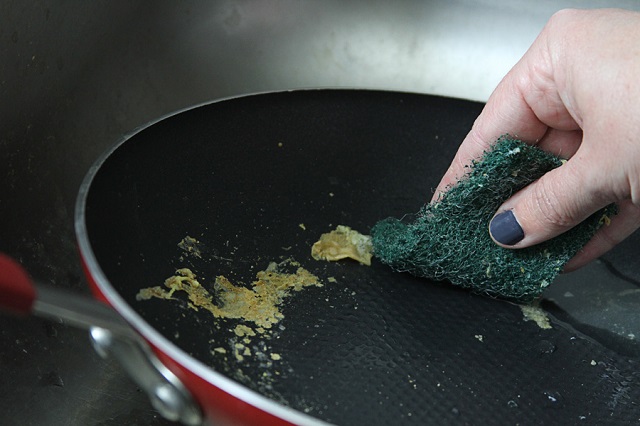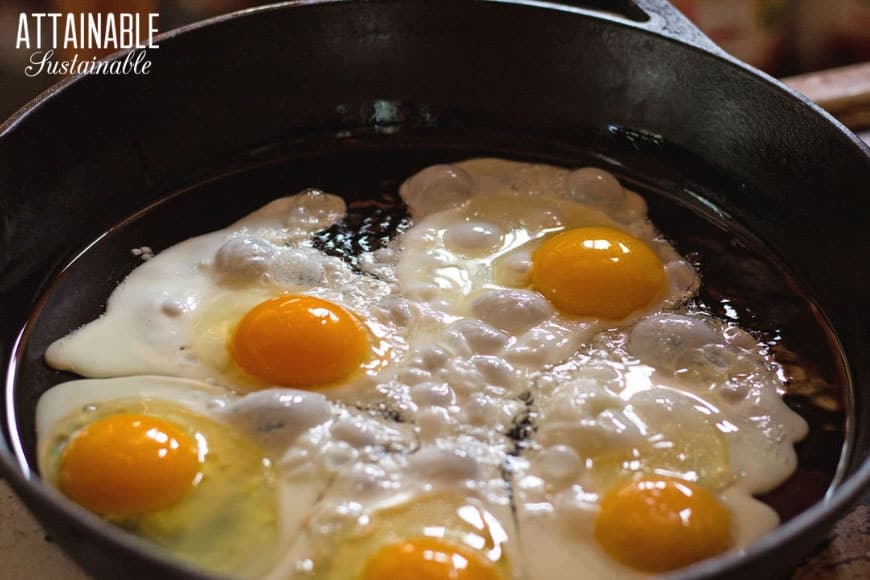Part 4 – So What Do We Do?
Over the past three weeks, we’ve looked at the story of DuPont and their continued production of the chemical compound C8 despite studies that indicated danger to humans. In that time, I have heard anecdotes from family and friends about the dangers of Teflon and its component parts, specifically that it has caused (or that exposure was correlated with) cancer in humans and harm to pets.
While extreme levels of C8 exposure have likely contributed to various cancers, thyroid and digestive problems, and possibly even birth defects, there is evidence that low levels of exposure can impact the immune system, the nervous system, even how we metabolize various food nutrients. Normally this would be a moot point since DuPont was forced to phase out C8 in 2015, but there are two points of concern that linger in my mind: the first is that their replacement chemical Gen-X has produced the same results in laboratory rat tests that C8 did (namely cancer and reproductive problems[1]), and the second is that although C8 can no longer be produced in the US, it is still produced elsewhere (like China), and it is still present in pre-2015 American-made cookware and other products.[2]
Small levels of exposure can come, not from working on the production line, but from using products that make use of those chemicals. According to the documentary “The Devil We Know,”[3] products that contained C8 while it was produced included such products as Clorox wipes, Gore-Tex jackets, airplane components, car components, Scotchgard, dental floss, grease-proof food wraps, popcorn bags, non-stick sprays on couches, car washes, camping equipment (boots, tents, sleeping bags), and Stainmaster carpet, just to name a few.
It is not usually my intent to call out specific brands, but these were items shown in rapid succession during the documentary. I have not at this point checked with each company to determine what they are now using in place of C8 (if they would even share that information), but one of the points the documentary was trying to make is that these chemicals are used in places we don’t expect… and just because C8 is no longer produced, we should not infer that we are safe from its effects.

Further Research
Assuming that non-stick, water-resistant, grease-resistant products you may be using still have some level of risk (either from extant C8 or newly-produced Gen-X), I would want to know what I can do to avoid those products, or at least limit my family’s exposure.
Just to keep everything straight, since there is a bit of alphabet soup if you go and do your own research (which I strongly recommend), here is what you need to keep in mind as you read your acronyms:
- “PFAS” (or perfluorinated alkylated substances) represents a category of chemicals such as PFOA, PFOS, and GenX.[5]
- “PFOA” is perfluorooctanoic acid, a.k.a. C8, and was phased out of production in the US in 2015; it is still produced in China.[6]
- “PFOS” is perfluorooctane sulfonic acid, the chemical compound used in Scotchgard. 3M phased out production in 2000, but it is still produced primarily in China.[7]
- GenX, is a replacement compound for PFOA, which is manufactured by Chemours (a spinoff company of DuPont).[8]

Tips for Detox
Again referencing “The Devil We Know,” there are steps you can take to be aware of products that contain these chemicals, and remove or reduce your use of them, or at the very least use them with caution if you’re not in the position to replace them yet. The website associated with the documentary has an excellent set of information and resources. I highly recommend checking it out when you have time. For now, I will summarize their one-week nonstick “detox” program,[10] which focuses on different rooms and spaces where you spend most of your time:
- In your Kitchen: If you can’t switch out your non-stick cookware for safe alternatives (such as stainless steel or cast iron), at least make sure you’re not heating it above what you need to cook your food. Nonstick compounds will begin to burn off the pan and into the air at high temperatures. If you have birds in the house, be extra careful about your cookware, as bird air sacs are incredibly sensitive – much more than human lungs.
- In your Bathroom: Use all-natural grooming products whenever possible, especially dental floss, which is usually covered in nonstick compounds to help it slide between your teeth. Your best bet is to find an alternative with natural wax. Make sure your menstrual products are made from 100% natural fibers (like cotton) – they are used against sensitive skin that can more easily absorb unwanted chemicals.
- In your Living Room: Beware of flame-retardant chemicals that are commonly used on couches before you purchase one. Avoid using products like Scotchgard and spill-resistant treatments on your couch once it’s in your house. Stop using air fresheners and deodorizing sprays, as they can contain irritants for your lungs.
- In your Bedroom: Beware of flame-retardant chemicals that are commonly used on your mattress before you purchase one. Stain-resistant carpet is a concern, especially for babies and pets, which spend a lot of time on the floor and have more sensitive lungs. Get a natural fiber carpet when it’s time to switch, and make sure to use a plant-based carpet cleaner.
- In your Office: Be careful about reheating leftovers in the microwave if they’re in plastic. Your best option for leftovers is glass or Pyrex containers. Be sure to stay away from #3, 6, and 7 plastic bottles, either for bottled water or filling your own reusable bottle. Those numbers can leach unwanted chemicals into your water.
- In your Car: Beware of plastic water bottles in hot cars, as high temperatures can make the plastic leach chemicals into your water. Avoid car air fresheners, as they can contain irritants for your lungs. Finally, beware of fast food wrappers, as many of them still contain PFAS. Hot foods especially can hasten the transfer of PFAS from the wrapper to your food.
- When you’re Outside: Avoid DEET if you can; if you can’t, spray it on clothes instead of skin. Look into essential oils instead of bug sprays. Look for safe sunscreen (Goddess Garden Organics is recommended on the website). Look for water-resistant instead of water-proof materials (Marmot is a recommended brand on the website).
You will find a lot more detail and additional recommendations on the website regarding actions you can take and how to get involved, if you so choose. You should also know that Pennsylvania has its own PFAS action team, assembled by Governor Wolf in September 2018.[11]

Ultimately, there are people who still argue that some compounds in the PFAS are allowed to be made because there is not enough conclusive scientific evidence to prohibit their manufacture, OR that the level of contact from using everyday items is not enough to be dangerous. Since these chemicals are biopersistent (they won’t break down), some articles point out that throwing them away will put them in the landfill where the chemicals will leach into the groundwater or into an incinerator where the chemicals will be dispersed into the air. Given this, a common recommendation is to use your nonstick cookware responsibly until the end of its useful life and then replace it with a nonstick alternative.[13]
I, for one, am not overly optimistic about the carcinogenic and reproductive studies performed on rats in relation to some of these chemical compounds that are currently on the market. My personal take is that I would rather err on the side of safety if I have an option and can afford the alternative. If I can’t, I will do what I can to limit any potential exposure, and in the meantime, I’ll do my best to stay informed.
Thanks for reading!
[1] https://theintercept.com/2016/03/03/new-teflon-toxin-causes-cancer-in-lab-animals/
[2] https://pubs.acs.org/doi/10.1021/acs.estlett.6b00435
[3] https://en.wikipedia.org/wiki/The_Devil_We_Know
[4] https://truthout.org/articles/dupont-and-chemours-settle-teflon-toxin-lawsuit-for-up-to-921-million/
[5] https://en.wikipedia.org/wiki/PFAS
[6] https://en.wikipedia.org/wiki/Perfluorooctanoic_acid
[7] https://en.wikipedia.org/wiki/Perfluorooctanesulfonic_acid
[8] https://www.chemours.com/en/about-chemours/global-reach/fayetteville-works/fayetteville-works-toxicology
[9] https://www.attainable-sustainable.net/cast-iron-cookware/
[10] https://thedevilweknow.com/take-action/
[11] https://www.theintell.com/news/20180920/gov-wolf-establishes-action-team-to-deal-with-pfas
[12] https://www.huffpost.com/entry/ketchup-or-pfas-with-those-fries-researchers-raise_b_58914c14e4b080b3dad6fd5e
[13] https://www.telegraph.co.uk/foodanddrink/foodanddrinkadvice/11643213/Are-we-really-being-poisoned-by-non-stick-pans.html
0 Comments